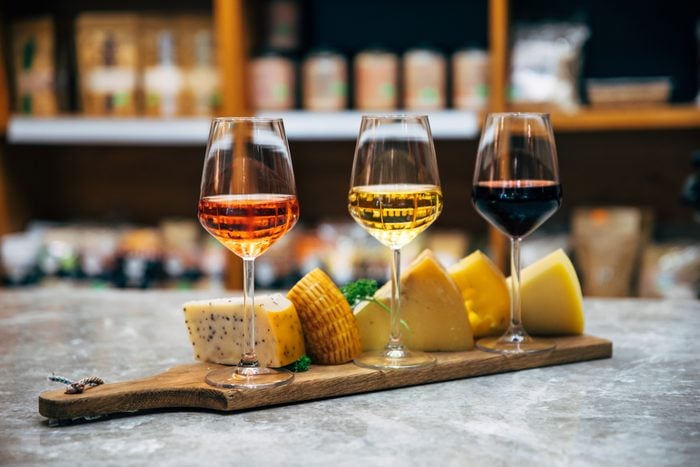Need to know which wine to serve with cheddar? Is port the only thing that goes with Stilton? Here are the wine and cheese pairings you need for every cheese board, party platter and picnic.
15 Wine and Cheese Pairings Everyone Should Know
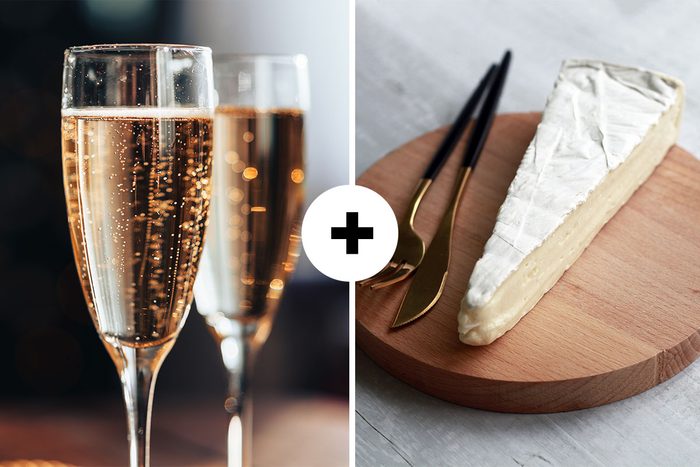
Champagne or Sparkling Wine
Honestly, don’t wait until a special occasion to drink bubbly. Whether French Champagne , domestic sparkling wine, Italian Prosecco or Spanish cava, thanks to their effervescence, high acidity and toasty, nutty flavors, they’re all perfect food wines. They make very good cheese partners, too.
Drier bubbly, like brut Champagne, cuts through the creaminess of Brie wonderfully, and matches aged cheeses from France and Switzerland, like Comte and Gruyere, particularly well. Serving a triple crème cheese like Brillat-Savarin? Try cava. The coarser bubbles make a great companion for the ultra silky butteriness. And it’s no secret that Prosecco loves Parmesan! Here are some of our other favorite cheeses you might be missing.
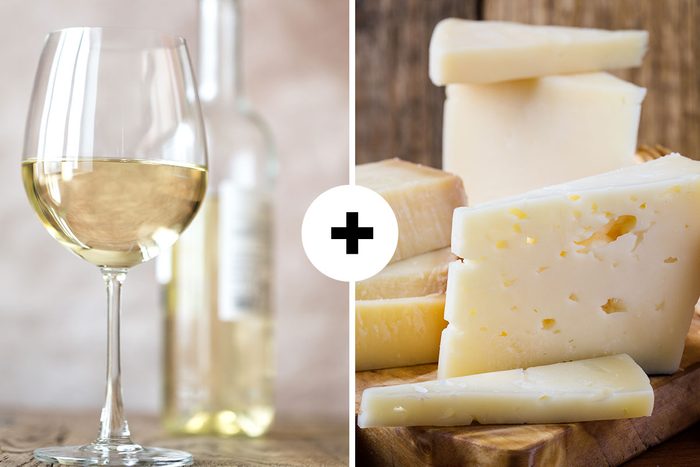
Pinot Grigio or Pinot Gris
While both originate from the same grape variety, there are some differences between pinot grigio and pinot gris, and it affects how either wine tastes with cheese. Both have great acidity, which makes them fantastic to sip with food, but Italian pinot grigio is often lighter-bodied and crisp with vibrant citrus flavors. Think about serving this with cheeses like Asiago, mozzarella or even creamy burrata.
Pinot gris from the Alsace region of France and domestically from western states like Oregon is richer and a little more complex. You might taste tropical fruits, which pairs nicely with an aged cheddar or Gouda. Here are a few tips to make wine taste better.
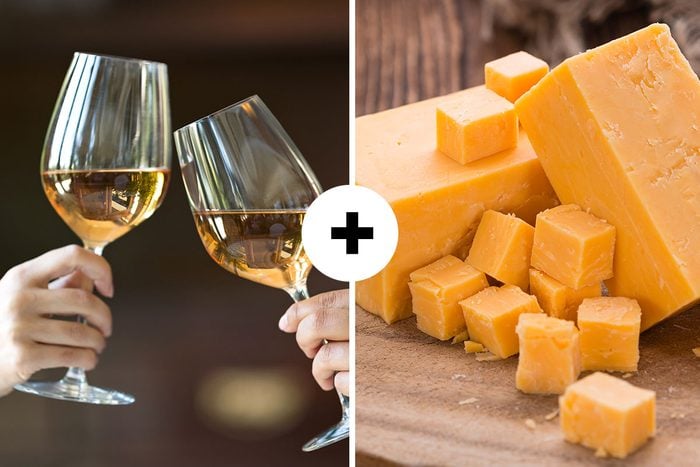
Chardonnay
Chardonnay varies greatly from region to region and winemaker, but two most common styles you’ll find are oaked and unoaked wines. Crisp, high-acid unoaked chardonnay is a go-to for fresh goat cheese. On the other end of the spectrum, a big oaky chardonnay is good with a semi-hard cheese, like a buttery cheddar or Havarti. In between, chardonnays with balanced oak and riper fruit go swimmingly with things like Brie and Camembert. Whatever cheese you put out, use the right tools, like good cheese knives.
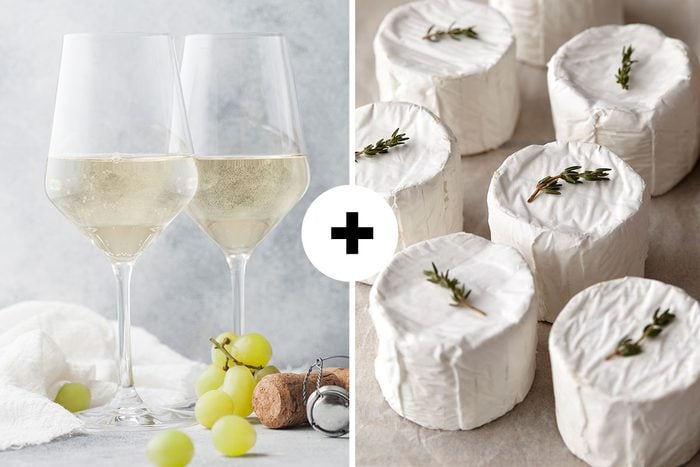
Sauvignon Blanc
Grassy, herbaceous, citrusy, minerally—these are just some of the characteristics of sauvignon blanc. Whether the wine hails from New Zealand, California or Washington State, think of that freshness when looking to pair it with cheese. Fresh goat cheeses go great with sauvignon blanc, as well as Brie, feta and Asiago.
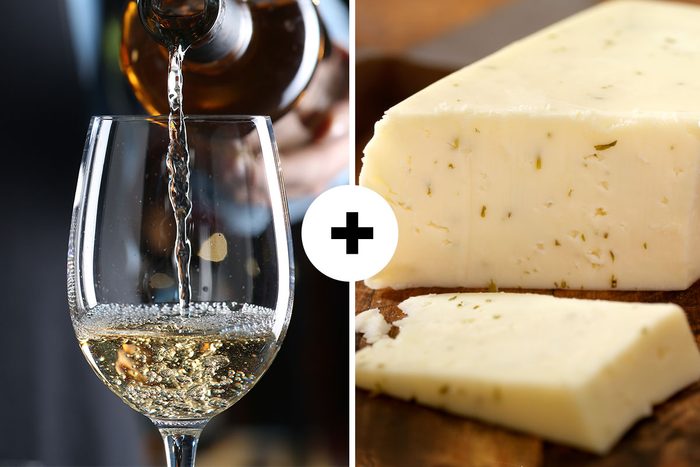
Riesling
Of the many types of wine, the versatile riesling is one of the best for an all-around cheese selection. Because it comes in a wide range of styles, from dry and crisp to viscous and sweet, it goes the extra mile to pair with various cheeses.
Dry or off-dry riesling (you might see Kabinett on the label) go with the most cheeses, from asiago to Colby, Monterey Jack, Havarti and most cheddars. And it’s a match made in heaven with raclette. A sweeter riesling (you might see Spätlese on the label) is terrific with really salty, bolder flavored cheeses like Gorgonzola, aged Gouda or Parmesan.
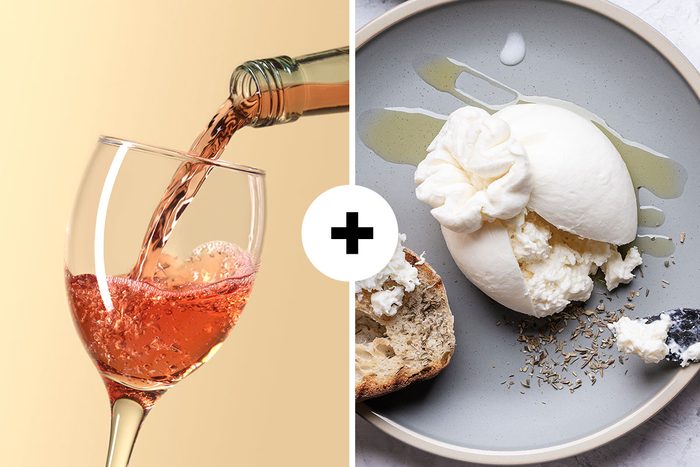
Rosé
Don’t only sip pink wine in warmer summer months. Rosé is perfect all year long! Because it’s made from red wine grapes—including pinot noir, syrah, cinsault and grenache—all over the world, rosé varies in color and styles, from pale pink and light and crisp to big and fruity with darker hues.
Generally speaking, the lighter wines, like Ina Garten’s favorite rosé or those from Provence, are a nice accompaniment to fresh cheeses like creamy burrata, chevre and even a smooth Havarti. The fruitier, darker rosé wines, like those made from syrah grapes, like a firmer, bolder cheese. Think aged cheddar or Gouda.
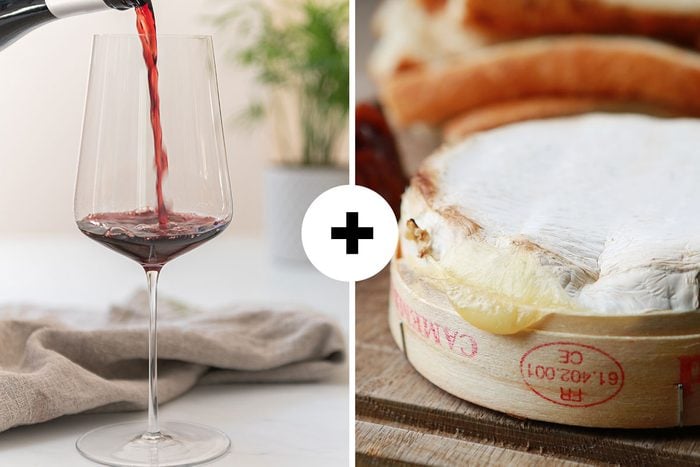
Pinot Noir
A typically medium to light-bodied wine, pinot noir can be earthy and savory, as well as fruity with cherry and berry flavors. It’s a lovely wine with floral aromas and spice, and just enough acid to make it super food-friendly and an excellent counterpart to many different cheeses.
Think about serving pinot noir along with earthy Camembert, Brie or pungent cheeses like Taleggio and Reblochon. A light and fruity pinot noir also stands up well to Combozola, a creamier mild blue cheese. When it’s time to serve, make sure you have the best wine glasses on hand.
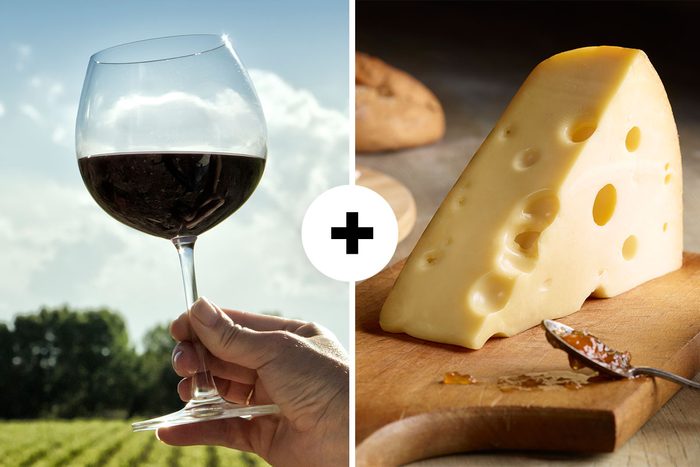
Malbec
Most malbec comes from Argentina, but the grape itself is also used in many Bordeaux blends. Favored for its rich, velvety fruit and big inky color, it’s often thought of as a meat wine, but there are plenty of cheeses that go with it, too. Pair malbec with semi-hard cheeses like cheddar, Colby or a nutty Edam from the Netherlands.
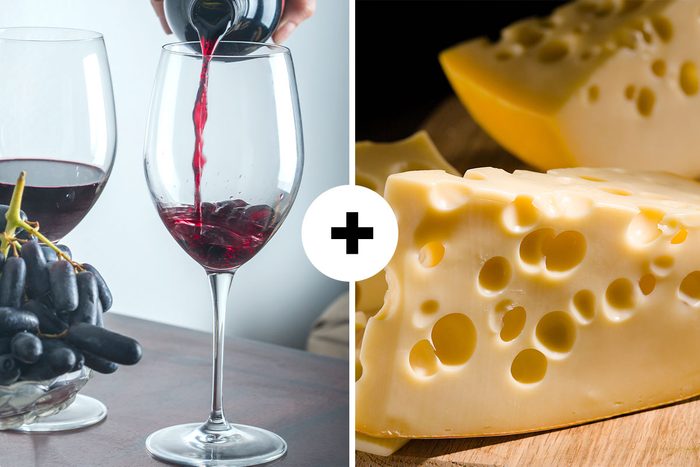
Merlot
Thanks to its plush, silky texture and lush red fruit flavors, merlot goes well with just about everything: The bold sharpness of cheddar; smooth Havarti; and a mild nutty Swiss. Thanks to the soft tannins, merlot pairs nicely with pleasantly pungent, creamy Taleggio, too. Perfect if you’re a member of a cheese of the month club.
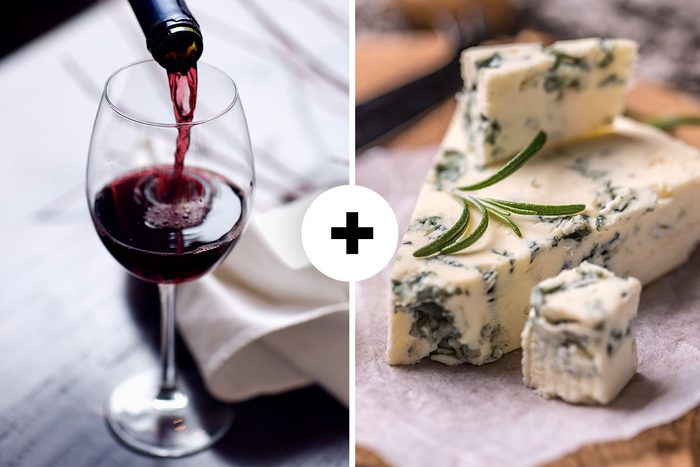
Cabernet Sauvignon
Cabernet sauvignon is one of the most recognized styles of red wine. Rich with big fruit flavors like black cherry, blackcurrant and spice, plus robust tannins, it’s easy to see why it’s so popular around the world. You’ll want to sip this alongside an equally big and bold cheese like aged cheddar, or blue cheeses like Gorgonzola and Roquefort.
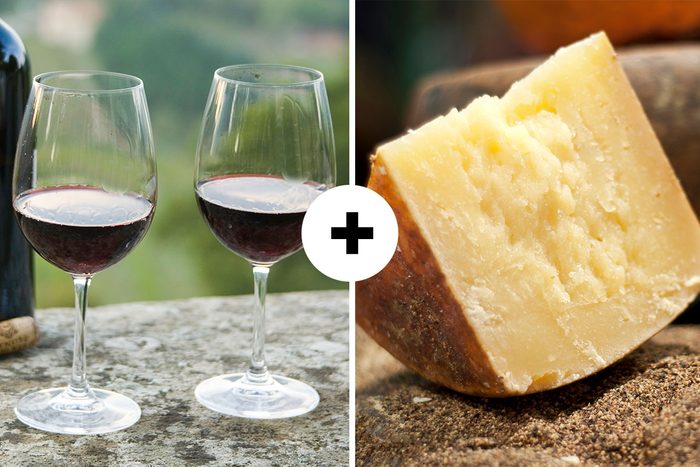
Chianti
Think local when it comes to pairing food with Chianti. Made primarily with the sangiovese grape, the herbaceous quality and high tannins make it a perfect match for cheeses like tangy Pecorino, provolone and Parmesan.
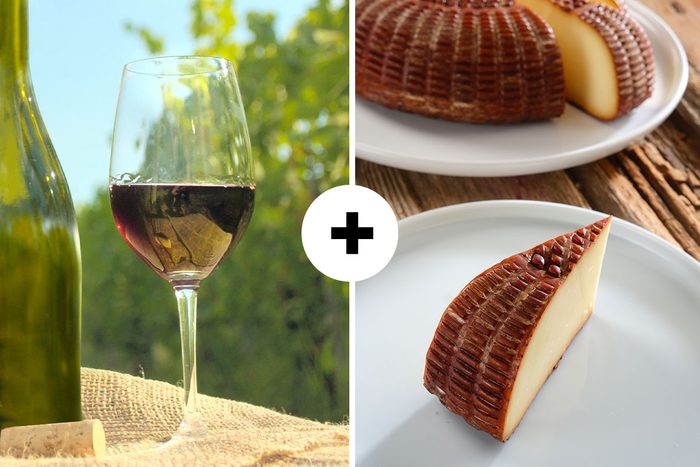
Zinfandel
We’re talking about red zinfandel, not the sweeter pink wine. Red zin is jammy with lots of cherry and brambleberry flavors, and a hit of spicy smokiness. This wine has some gusto! Harder cheeses like smoked Gouda, aged cheddar and Manchego all stand up to zin’s bold and sweet nature. Havarti, Gruyere and even Gorgonzola make nice pairings, too.
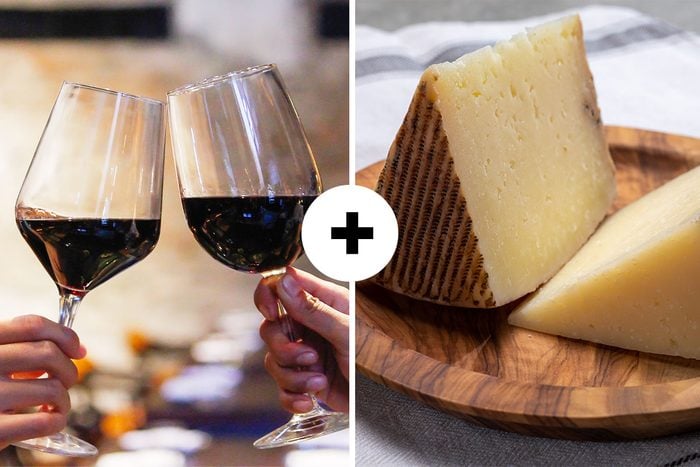
Syrah
Peppery and smoky, with lots of blueberry and plum flavors, syrah originally hailed from France’s Rhone Valley but is now widely made in Australia (known as shiraz), the U.S. and Chile. A firm but buttery Manchego matches syrah’s tannins, as do salty hard cheeses like cheddar, Edam and Parmesan.
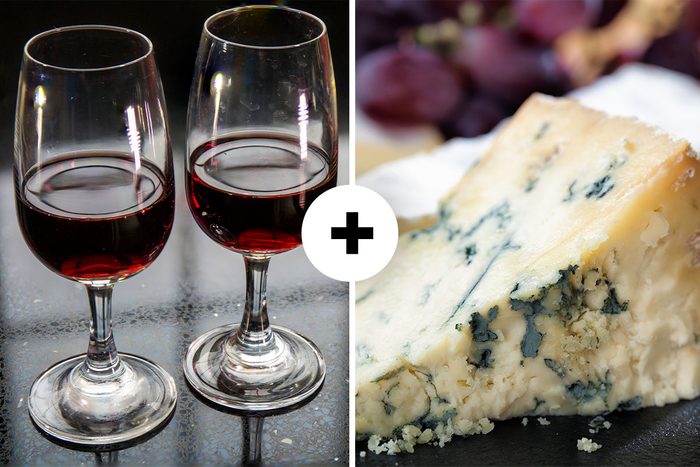
Port
A lovely young, sweet, ruby port served alongside a wedge of pungent Stilton or Gorgonzola cheese is a classic combination. But you don’t have to stop at the blues. Explore different ports and cheese combinations, like the full-bodied tawny port with a sharp and salty aged cheddar, or Gouda and Romano cheese. For a drier, young white port, try Gruyere.
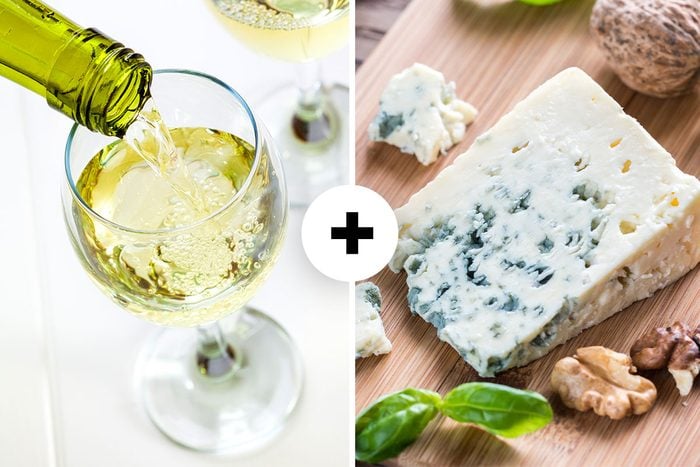
Moscato d’Asti
There’s something about this wine that’s pure magic. Perfumed with florals like honeysuckle and orange blossom, spritzy, sweet but not syrupy, it’s such a delicious food wine. Moscato d’Asti goes particularly well with some of the funkier cheeses you might sip with port or other fortified wine, like a creamy blue Cambozola or Gorgonzola. Even an earthy Camembert goes quite well with this sweeter wine. Any of these would make a great addition to your holiday cheese board.

